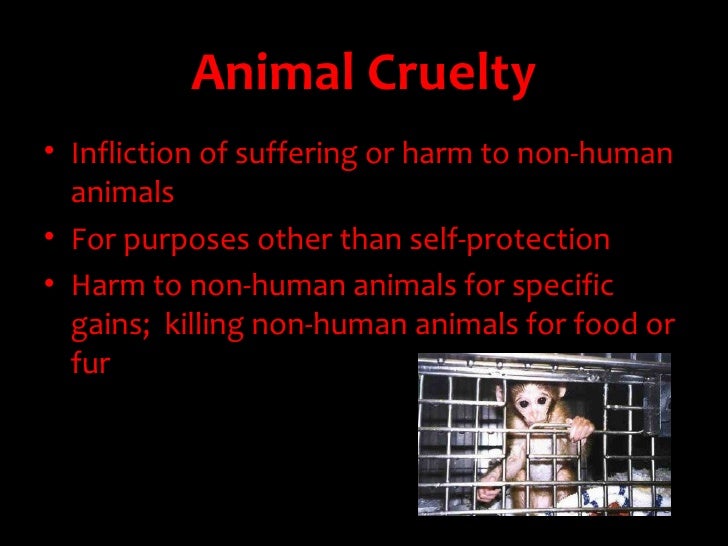Animal cruelty, a heinous affront to sentient beings, elicits intense emotional responses and provokes critical discussions about ethical standards within society. The question of whether animal cruelty should unequivocally be categorized as a felony intersects with moral, legal, and ethical dimensions, meriting in-depth exploration.
First, it is essential to delineate what constitutes animal cruelty. This term encompasses a spectrum of maltreatment, ranging from neglect and abandonment to intentional infliction of pain and suffering. Each form of cruelty poses significant ramifications—not only for the animals involved but also for humans who share the planet with them. The societal implications of animal cruelty cannot be overstated, as they often reflect deeper behavioral issues that may escalate into violence against humans.
Morally, the argument for elevating animal cruelty to felony status stems from the notion of compassion and the ethical obligation to prevent suffering. The moral landscape has evolved significantly, transitioning from anthropocentric worldviews—where human interests overwhelmingly dominate—to more inclusive perspectives that recognize the inherent rights of animals to live free from harm. As sentient beings capable of experiencing pain, animals deserve protection under the law, which further lends credence to the proposition that acts of cruelty should bear severe consequences.
Moreover, allowing animal cruelty to remain a misdemeanor trivializes the suffering of animals and undermines the moral fabric of society. When society turns a blind eye to animal suffering, it creates an environment where apathy towards abuse proliferates. Felony status would not only signify a societal acknowledgment of the gravity of such acts but also serve as a deterrent to potential offenders. Stricter penalties may reduce repeat offenses and encourage a culture where the welfare of animals is paramount, fostering a societal ethos rooted in kindness and empathy.
From a legal standpoint, the implications are equally compelling. Currently, laws governing animal protection vary significantly by jurisdiction. Some regions impose stringent penalties for animal cruelty, while others afford minimal protections. The inconsistency creates confusion and diminishes the enforceability of such laws, leading many to argue for a unified legal framework that designates animal cruelty as a felony. This would not only standardize the legal repercussions across various jurisdictions but would also buttress the seriousness with which such acts are treated within the judicial system.
In many states, animal cruelty is classified as a misdemeanor, which often results in relatively light penalties such as fines or short imprisonment terms. When one considers the profound impact of such acts on the animal victims, as well as the wider implications for public safety, the current legal landscape is undeniably insufficient. A felony classification would address these deficiencies, imposing harsher penalties that reflect the gravity of the crime. This would signal to both potential perpetrators and the public that society unequivocally condemns such behavior and is committed to safeguarding the welfare of all creatures.
Ethically, the discourse around animal rights has garnered substantial traction in recent years, spawning movements aimed at advocating for a more humane treatment of animals. The recognition of animals not merely as property but as beings with their own rights necessitates a reevaluation of legal classifications. Advocates argue that upholding a moral responsibility toward animals is foundational to a just society. Laws should reflect a commitment to ethical standards that prioritize compassion and care over indifference and cruelty.
Furthermore, equating animal cruelty with felonious behavior resonates with foundational ethical theories such as utilitarianism and deontology. The former emphasizes the greatest good for the greatest number, suggesting that alleviating animal suffering contributes to overall societal well-being. The latter underscores the inherent duty to treat all beings with respect and dignity regardless of their utility to humans. Heightening the legal consequences of animal cruelty aligns with these ethical frameworks by promoting welfare and building a society that values all forms of life.
Several counterarguments persist regarding the classification of animal cruelty as a felony. Detractors often cite concerns regarding overreach and the potential criminalization of innocent behaviors—such as farm practices or animal husbandry. Nevertheless, these concerns can be effectively managed through careful legal drafting that distinguishes between legitimate animal husbandry and egregious acts of cruelty. The objective is not to vilify all interactions with animals but to safeguard against abuse and neglect.
In conclusion, the question of whether animal cruelty should be classified as a felony is far from black and white. The moral urgency, legal inconsistencies, and ethical imperatives all lend weight to the argument for reform. Societies must progress towards embedding compassion within their legal frameworks and recognize that cruelty toward animals is indicative of broader societal ills. Designating animal cruelty as a felony can foster a culture of respect and awareness of the intrinsic value of all living beings, ultimately leading to a more humane world. The stakes are high, and the moral calling is clear—society must act decisively to protect the vulnerable, ensuring that empathy reigns supreme in every facet of life.









